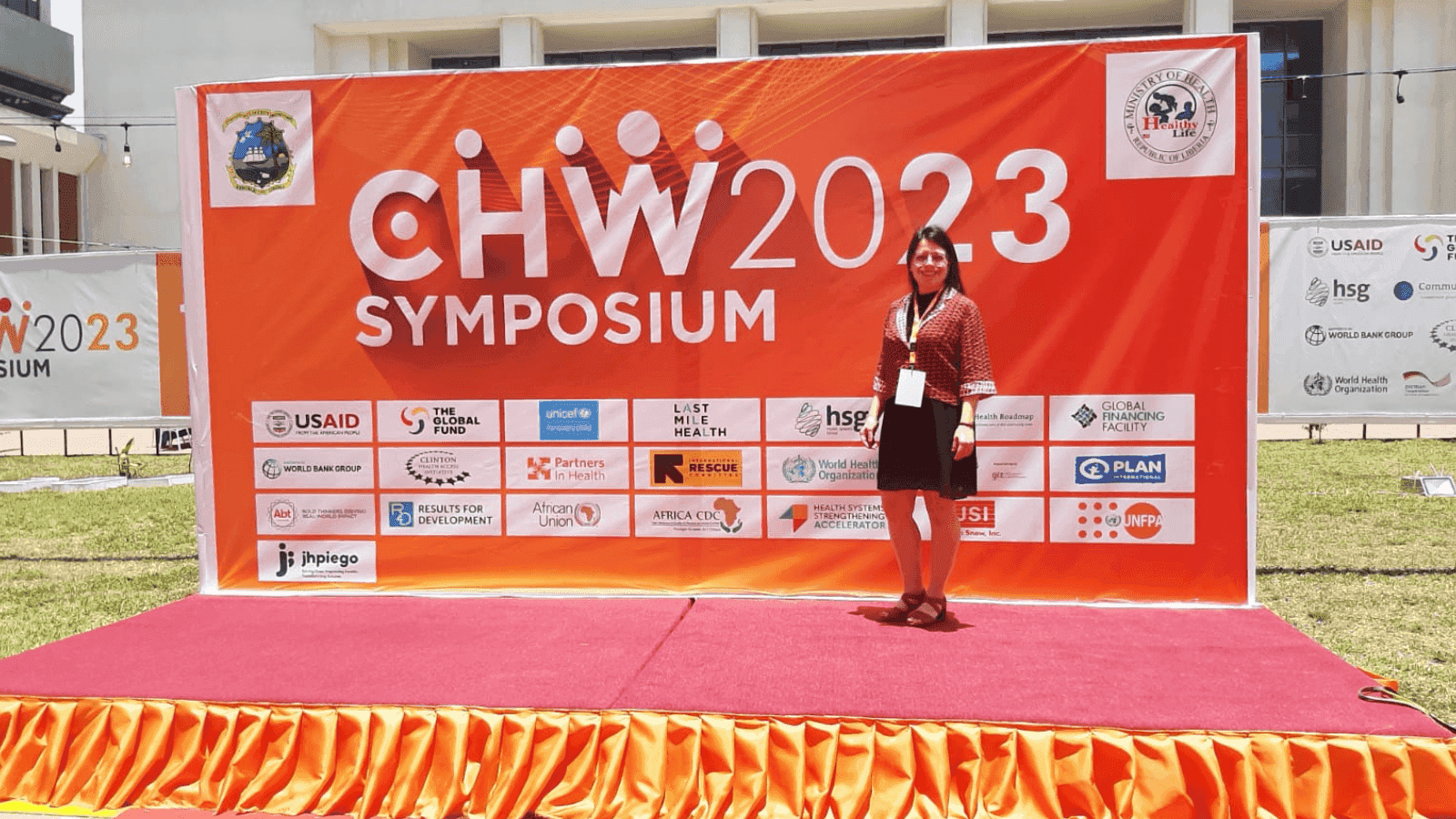Voices from the 3rd International Community Health Workers Symposium
Reflecting on discussions, Silvia Poggioli suggests equipping community health workers with an effective job-aide like Boost is investing in quality care for all
Reflecting on discussions, Silvia Poggioli suggests equipping community health workers with an effective job-aide like Boost is investing in quality care for all
Published on 23 May 2023 | Silvia Poggioli, Avert's Fundraising and Partnerships Manager
In March I flew to Liberia to participate in the third International Community Health Workers Symposium, presenting evidence on the value of Avert’s job aide for community health workers, Boost. Boost supports community health workers in their daily tasks – helping them to do their job better, connect with their clients, and feel recognised and supported.
On the flight out I reflected on my own experience as a client of a community health worker. Back in 2017, I was pregnant with my first child in Brazil, and very anxious about giving birth in a foreign country without the support of my family of origin and friends. At that time, for the first time in my life, I came across a community health worker.
Paula* came to my home to see how my pregnancy was progressing. She brought to my doorstep all the necessary information for a healthy pregnancy, including nutrition tips and STI screening. She brought me the referral slips when I was due for a scan at the hospital. Once my son was born, she came to my home to weigh him, check my mental health and lactation status, and be there if I needed advice, support, or strength. Thanks to Paula, I managed an otherwise more arduous breastfeeding process and avoided the suggestions and mis-advice from friends and grandparents that I should compensate with the bottle. Thanks to Paula, I exclusively breastfed my child until he was nearly 12 months old.
Across low- and middle-income countries, and increasingly in high-income countries, community health workers represent the first point of contact between a health seeker and the healthcare system. They play a crucial role, compellingly evidenced by the COVID-19 pandemic when they were pivotal in addressing misinformation and mistrust – improving people’s lives through vaccine uptake and adherence to movement restrictions. Community health workers support individuals in understanding what is available to them, boosting self-care and self-agency. They help to demystify healthcare services and options and often make crucial decisions on the spot, providing first-line treatment, conducting screening tests and making referrals.
However, among the estimated 3 million community health workers globally many do not receive the quality training, supervision, and continuing learning opportunities they need and deserve in their roles. They also lack tools and resources designed with them and for them, that are easy to access, localised, accurate and up-to-date to support their knowledge, confidence and skills to optimally care for their clients.
Among the estimated 3 million community health workers globally many do not receive the quality training, supervision, and continuing learning opportunities they need and deserve in their roles.
Arriving at the conference I was curious and thrilled by the opportunity to meet like-minded organisations and individuals like the Community Health Impact Coalition who are striving to make professional community health workers the norm: salaried, skilled, supervised, supplied and protected. Knowing there would be a significant presence of community health workers at the conference I was also eager to speak to as many of them as possible to hear how Boost could support them.
First I met Stella* from Uganda, who shared her passion for her role and how her community members knock at her door anytime to seek advice. Often this encompasses sexual health queries as those have an enormous impact on people’s relationships, not just from a disease perspective but also from a pleasure and safety angle. When I showed her Boost, she was fascinated by the simplicity of the tool, the positive and action-oriented language and how a mobile-first device would make her life easier, enabling her to navigate complex topics together with clients while sharing the content with them.
I then met with Chifundo*, a mentor mother from Malawi, who shared her challenges in advising young adults and adolescent girls recently infected with HIV. It is arduous for them to disclose their status to their family, a partner and friends and navigate access to health services, fearing community stigmatisation. We discussed Boost's functionalities and screening tools and the value of detecting problems early to make referral and treatment effective while helping clients make better-informed health decisions for themselves, building their agency and promoting their self-care.
Thandiwe*, from Zambia, shared her experience working in the field during COVID-19 when restrictions on movement meant she could barely meet with her supervisor. At the same time, Covid made it impossible to refer immunosuppressed clients to health clinics for treatment. A resource like Boost would have served the government in rapidly cascading new guidelines, improving service delivery and implementation fidelity. She also shared about the widespread misconception on the effectiveness and safety of vaccines and how Boost would have supported her greatly in fighting misinformation since clients and patients rely on information that is accredited and from trustworthy resources.
When I left the conference, my hope to see HIV being beaten in our lifetime was renewed. I knew that an important part of the solution remains in community health and the power of partnerships and continued engagement with community health workers and those countries and organisations sustaining their work. I felt confident and proud we are doing the right thing at Avert, investing in the transformative leadership brought about by community health workers, peer educators and outreach agents.
*All names are fictional.
Read more about how Boost is supporting community health workers in Zimbabwe. For information about become a Boost partner or adopter, contact Silvia Poggioli.
